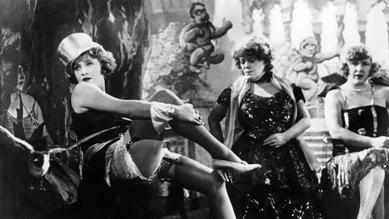

Josef von Sternberg’s groundbreaking 1930 film showcases the conflict between social respectability and the temptations of sensuality in Weimar Germany.
After failing to achieve much box office success in Hollywood, the Vienna-born director Josef von Sternberg went to Germany on the invitation of the famous actor Emil Jannings, with whom he had previously worked, to make a film from Heinrich Mann’s popular novel Professor Unrath. The result, released in 1930, was The Blue Angel, a stunning international success, one of Sternberg’s greatest pictures, that also launched the career of Marlene Dietrich.
Jannings plays a stuffy provincial teacher at a boy’s boarding school, hopelessly old-fashioned, mocked and despised by the students. When he discovers that they are sneaking out at night to a local nightclub called The Blue Angel, he goes himself in hopes of catching them and reprimanding the club for corrupting minors. There he sees the main attraction, a singer named Lola Lola (played by Dietrich), but instead of saving his students from her bad influence, he himself becomes infatuated. This relationship leads him down the road to humiliation and a complete loss of dignity.
Sternberg was a master of light and shadow. The Blue Angel displays his great instincts for the telling shot, ingenious use of screen space, and visual mystery. The scenes with the professor walking alone through the streets on the way to the nightclub seem to sum up an entire visual style in German film. And although some of it seems static compared to the director’s later work, it’s also earthier, less baroque, more emotional and moving.
Marlene Dietrich was 28 at the time, and had been in movies for a decade, mostly in supporting roles. Sternberg chose her for the role of Lola against all advice, and of course she turned out to be perfect. The image of her singing “Falling in Love Again” in her top hat and black stockings has become legendary. (The outrageously tacky nightclub costumes are a hoot). But she’s also convincing in her quiet scenes with Jannings—tender, gently humorous without mockery or contempt. Even later when she is cruel to him, there is sadness mixed in with it. Dietrich’s confident sexuality caused a sensation on the film’s release, but the ambiguity of her performance—she really does love the old man—has given it staying power.
In truth, the film presents contradictory messages. Overtly, it tells a simple story of degeneration—an upright old man foolishly gives in to his carnal nature and is punished for it. The trouble with this story is that the professor is clearly a strict and unlovable authority figure at the beginning of the film, but is humanized by his love for the cabaret singer. Sternberg is always poking fun at the teacher’s prudishness, as when we see him staring dumfounded at the naked breasts on a statue. The film’s sympathies are secretly with Lola and her world. But in 1930, audiences could only be treated to decadence if it was wrapped in morality, and thus we have The Blue Angel‘s double message: sex will free you, and it will destroy you.
In this period before dubbing or subtitles, movies were often shot twice in different languages—in this case, German and English. The German version of The Blue Angel is superior. This essential film survives in a gorgeous print that seems almost pristine, on Blu Ray and DVD.






